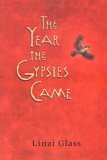Hour of challenge: 17 hours, 45 minutes
Hours reading/blogging: 7 hours, 45 minutes
Books read: 2 full, 1 partial
Pages read: 632
The Year the Gypsies Came Linzi Glass 260 pages
I first picked up this book because it was on some YALSA list that a coworker friend picked up for me at ALA midwinter. She had scrawled "sleeper hit of the year" next to the title.
Emily is almost 13 and lives in the suburbs of Johannesburg in 1966. Her parents marriage is strained, and they often have long-term house guests so they can sweep their issues under the rug for the company. Her mother is a real piece of work with quick mood swings and constantly resentful that her husband cannot provide her with the type of luxury she grew up in. Her sister, Sarah, deals with the tension by keeping everything perfect.
One summer, an Australian family who live in camper come and live with them (in their camper, in their driveway.) The father, a friendly wildlife photographer, is violent towards his sons, especially his oldest, Otis, who reminds the reader of Lennie, without a George to watch over him.
What is striking about this book is the way Emily, the narrator, notices and tells of us the small details in her life:
There's Father's partner, Clive, beefy and large, sweating under his Panama hat. Cigar ash perched on his big toe. His naked fat feet in sandals. His wife, Ursula, her bright yellow hair piled high on her head in a beehive, laughs with Mother as they stand under the cool shade of the plum trees. Cherry-colored drinks in their hands. Mother's lime-green sundress is pulled tight into her waist to show off its small size. Sometimes Mother even checks with a tape measure to make sure her waist stays "twenty-four inches, Emily, never more." Ursula's waist is at least thirty-five inches, according to Mother.
Also, Glass grew up in South Africa during the apartheid era and this story clearly reflects that with the minor, but striking, details of day to day life of the privileged British children. There is much racism in the book, but it is not a major issue, rather a powerful backdrop of the story, which makes it all the potent because Glass does not bang our heads against the injustice of it.
The last few pages of the book contain a good glossary of the all the Afrikaans words and one of the Zulu words, but they're all defined well in context.


No comments:
Post a Comment